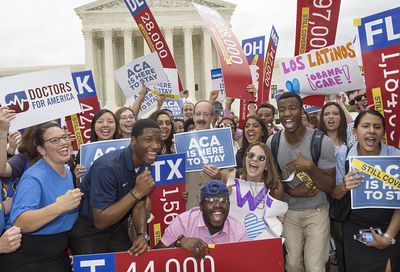Obamacare appears to have become more popular since Barack Obama left office.
Some 55% of Americans support the ACA, a record high since the law went into effect a decade ago, according to a new report by the Kaiser Family Foundation, while 37% of the 130,000 respondents in the nationally representative poll hold unfavorable views.
In 2010, when Obamacare was enacted, 46% of the public had a favorable opinion of it and 40% had an unfavorable view. Kaiser, a San Francisco-based nonprofit focused on health policy; it has conducted monthly public opinion polls on the ACA since it was enacted in March 2010.
Ahead of the ACA’s ten-year anniversary, three researchers from the foundation’s public opinion team also published an in-depth analysis of the 102 polls conducted that was published in Health Affairs, a peer-reviewed journal. (That did not include this latest poll released on Friday.)
“People who felt that the law had helped them were more likely to say that it had allowed someone in their family to get or keep insurance or made it easier to get health care,” the report said. “While those who felt hurt by the law were more likely to say that it had increased their health care costs.”
After President Trump was elected in 2016, “the threat of repeal became so real,” said Mollyann Brodie, the lead author of the report. “It was easy for Democrats to say, ‘Look at this president he’s trying to take your health insurance away from you.”
Others credit Obamacare’s popularity with the effective repeal of the individual mandate. Trump’s 2017 tax overhaul removed the tax penalty on the individual mandate, the requirement that those who don’t qualify for an exemption obtain health-insurance coverage.
“The future increase in the number of uninsured caused by repealing the mandate may not be exactly the same as the reduction in the number of uninsured caused by the mandate in 2016,” according to the Brookings Institution, a nonprofit think tank based in Washington, D.C.
The number of uninsured non-elderly Americans fell from more than 46.5 million in 2010 to just below 27 million in 2016. “However, for the second year in a row, the number of uninsured people increased from 2017 to 2018 by nearly 500,000 people,” a separate report by Kaiser found.
In the most recent Democratic debate among candidates seeking that party’s nomination for president, health care was in the spotlight. Both Senators Bernie Sanders of Vermont and Elizabeth Warren of Massachusetts reiterated their plans to enact “Medicare for All.”
That would replace the current health-insurance system with a single-payer national health-insurance program. While Minnesota Sen. Amy Klobuchar, former Vice President Joe Biden and former New York Mayor Mike Bloomberg pledged support for variations of the ACA.
If passed, Sanders’ plan would prevent 153 million Americans from obtaining employer-sponsored health insurance, an earlier Kaiser study found. Since 2009, average family premiums have increased 54% and cost $20,576 a year in 2019.
“Partisanship has not subsided when it comes to overall views of the law,” the study states. Given how divided lawmakers and voters are when it comes to “health-care arrangements it would be even harder to get bipartisan support for a Medicare for All plan,” Brodie said.

